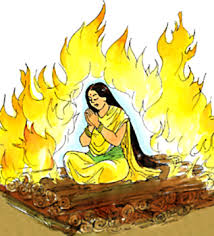SATI
Sati is the practice through which widows are voluntarily or forcibly burned alive on their husband's funeral pyre. A widow's status was looked upon as unwanted burden that prevented her from participating in the household work. Her touch, her voice, her very appearance was considered unholy, impure and something that was to be shunned and abhorred. A woman was considered pure if she committed sati. Sati was prevented by legislative enactment in 1829 due to the previous efforts made by Raja Ram Mohan Roy. Sati was banned again in 1956 after resurgence. There was another revival of the practice of sati in 1981 with another Prevention Ordinance passed in 1987.
Two illustrations are given as follows: In 1987 an eighteen years old widow Roop Kanwar, committed sati in a village of Rajasthan. Roop Kanwar told her father-in law that she wanted to commit sati. The case went to court, but no one was charged with for her death. Sati is reported to be prevalent in North-India. In another incident a 65 year old Kuttu, who died of burn injuries was forced to enter the funeral pyre of her husband Mallunai. The Madhya Pradesh government ordered a magisterial inquiry in Panna district in 2005. The matter was also discussed in the Union Parliament. Meanwhile a four-member National Commission for women (NCW) delegation visited Panna district to look into the incident.
